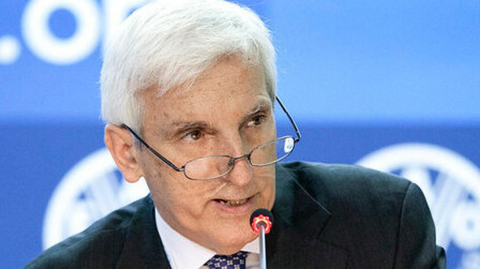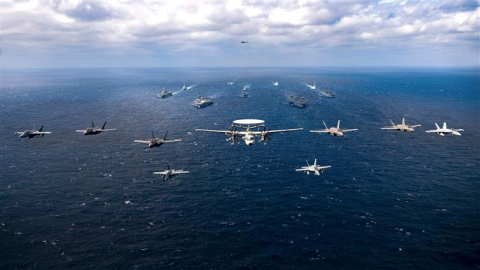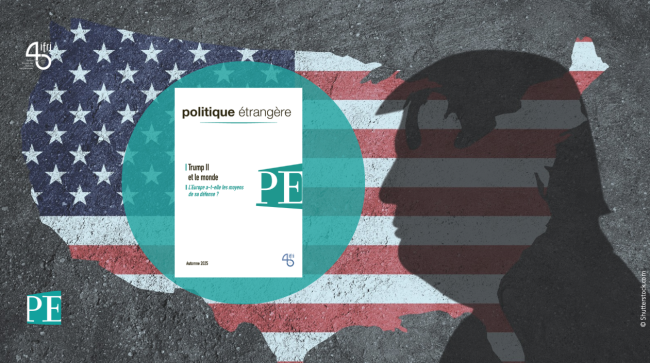Can Washington move beyond "Ukraine fatigue"?
For the past two years, the United States has been at grips with an increasingly revisionist Russia in continental Europe. The crisis in Ukraine deteriorated the state of the bilateral relationship with Moscow [1] to what could be an all-time low since the end of the Cold War [2].
As a result, the U.S. had to reaffirm its involvement in the security of its NATO and bilateral allies. Can the United States find ways forward to improve both the situation in Eastern Europe and its relationship with Russia? Military operations in Syria, now conducted by the two countries with a modicum of coordination, are a complicating factor to say the least.
Even though Washington considered providing lethal military aid to Ukraine, and in spite of very strong rhetoric on both sides, the United States and NATO avoided direct military confrontation with Russia during the most acute phases of the Ukrainian crisis. Indeed, despite the lack of understanding and confidence, channels (and backchannels) of communication between the U.S. and Russia were never broken, and the bilateral dialogue went on unhampered. So far, both countries have managed to tolerate each other and cooperate a minima on common security challenges due to a shared feeling of mutual interests in doing so. As Richard Weitz puts it, they “share the negative goal of keeping their differences […] from escalating into a direct armed conflict [3].
The present U.S. administration is not trying to improve the bilateral relationship, however: indeed, no “Reset 2.0” seems possible until at least the end of the Putin era. Instead of a grand strategy aimed at addressing Russia [4], Washington therefore develops what seems to be a pattern of pragmatic waiting out based on short-term priorities towards Moscow.
This policy has led Washington to slowly tilt towards Russian interests by forcing Kyiv to make further concessions with Moscow. Over the course of the summer of 2015, U.S. Assistant Secretary of State Victoria Nuland and her Russian counterpart Grigory Karasin developed a powerful relationship with regard to the application of the Minsk Two agreements [5]. This backchannel bypassed Kyiv altogether and ended up forcing Ukraine to speed up the implementation of the “special status” in Donbas (which will give full-fledged legitimacy and legality to the separatist entities in Donetsk and Luhansk) and the organization of local elections in the Donetsk and Lugansk “People’s Republics” (DPR/LPR) under a new electoral law.
Other factors of great import also impact the U.S.’s stance on the Ukraine issue, compounding the sense that Washington is suffering from a “Ukraine fatigue”. As a matter of fact, it is also because the United States and Russia need greater interaction in the fight against Bashar al-Assad and the Islamic State in Syria and Iraq that compromises were forced upon Ukraine.
Even though U.S. financial support to Ukraine remains unconditional [6], U.S. policy makers may still find it difficult to justify this course of action without (completely) legitimizing Russian actions in Crimea and Eastern Ukraine.
To keep reading this Editorial, please download the file below.
[1] “Final Report of the International Security Advisory Board (ISAB) on U.S.-Russia Relations”, United States Department of State, December 9, 2014.
[2] Jeffrey Mankoff and Andrew Kuchins, “Russia, Ukraine, and U.S. Policy Options: A Briefing Memo”, Center for Strategic and International Studies (CSIS), January 2015.
[3] Richard Weitz, “U.S.-Russian Relations Beyond Ukraine: Realities and Recommendations Moving Forward”, Center on Global Interests, May 2015.
[4] “White House to unveil call for strategic patience”, Foreign Affairs, February 2015, available on: <http://foreignpolicy.com>.
[5] Vladimir Socor, “Obama Administration Undercutting Ukraine’s Position in the Minsk Armistice Negotiations”, Eurasia Daily Monitor, Volume 12, Issue 139, July 24, 2015.
[6] “White House fact sheet on U.S. assistance in Ukraine”, available on: <www.whitehouse.gov>.

Available in:
Regions and themes
ISBN / ISSN
Share
Download the full analysis
This page contains only a summary of our work. If you would like to have access to all the information from our research on the subject, you can download the full version in PDF format.
Can Washington move beyond "Ukraine fatigue"?
Related centers and programs
Discover our other research centers and programsFind out more
Discover all our analysesBrazil One Year Away from the October 2026 General Elections
Brazil’s general elections will be held on October 4, 2026, to elect the president, vice-president, members of the National Congress, governors, deputy governors and state legislative assemblies. For the presidential and gubernatorial elections, a second round will be held on October 25 if no candidate obtains a majority of the votes in the first round.
Trump II: The Clash of Ideologies
The second Trump administration brings together a number of very different, even opposing, ideologies: far-right populism, the reactionary Christian right, paleolibertarianism, and technolibertarianism. The most visible measures taken since Donald Trump's return to the White House have been populist in nature, with the president's authority strengthened, checks and balances weakened, a form of identity politics embraced, and economic nationalism implemented.
Water in Mexico: an Emergency that Will Wait
Access to water is already and will become increasingly problematic for Mexican economic actors due to the progressive scarcity of the resource resulting from climate change, a geographical distribution that does not coincide with that of the population or economic activity, and management that has so far been far too lax.
Donald Trump v. the States: the Case of New York
While the disruptive policies of the second Trump administration are being implemented at the federal level and on the international stage, they are also being felt in the federal states and major cities across the country. In the spring of 2025, several cases involving the state and city of New York demonstrate that the president’s attacks on environmental protection, the separation of powers, freedom of speech, etc., are also being carried out at the local level.













